Abraham Dies part-1
When Sarah died, at the age of 127 (Genesis 23:1), Abraham would have been nearly 140 (Genesis 17:17). It would seem more likely, then, that Abraham took Keturah as a wife well before Sarah’s death.
Still, Abraham has six sons with Keturah, including Midian, who becomes the father of the Midianites. And though Abraham gave gifts to the “sons of his concubines,” Genesis is quick to tell us that he gave all he had to Isaac, his sole true heir (Genesis 25:1–6).
Abraham then dies at the age of 175, an old man and full of years. Isaac and Ishmael reunite to bury Abraham at the cave of Machpelah (Genesis 23:17–20) where Sarah had been buried nearly 40 years earlier (Genesis 25:10).
His death is here related, though he lived till Jacob and Esau were fifteen years, just one hundred years after coming to Canaan; “the father of the faithful,” “the friend of God” [James 2:23 ], died; and even in his death, the promises were fulfilled (compare Genesis 15:15).
We might have wished some memorials of his deathbed experience; but the Spirit of God has withheld them – nor was it necessary; for (see Matthew 7:16) from earth he passed into heaven (Luke 16:22). Though dead he yet liveth (Matthew 22:32).
Genesis 25:5-11 KJV
[5] And Abraham gave all that he had unto Isaac.
[6] But unto the sons of the concubines, which Abraham had, Abraham gave gifts, and sent them away from Isaac his son, while he yet lived, eastward, unto the east country.
[7] And these are the days of the years of Abraham’s life which he lived, an hundred threescore and fifteen years.
[8] Then Abraham gave up the ghost, and died in a good old age, an old man, and full of years; and was gathered to his people.
[9] And his sons Isaac and Ishmael buried him in the cave of Machpelah, in the field of Ephron the son of Zohar the Hittite, which is before Mamre;
[10] The field which Abraham purchased of the sons of Heth: there was Abraham buried, and Sarah his wife.
[11] And it came to pass after the death of Abraham, that God blessed his son Isaac; and Isaac dwelt by the well Lahai–roi.
Genesis 25:5 KJV
And Abraham gave all that he had unto Isaac.
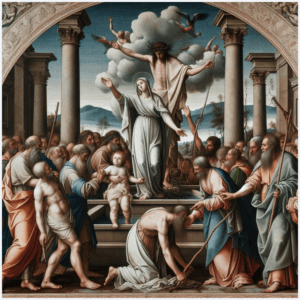 Even while listing various people groups and nations that would come from Abraham’s marriage to Keturah, this verse is quick to remind us that the legitimate line of Abraham travels through Isaac and none of these other sons.
Even while listing various people groups and nations that would come from Abraham’s marriage to Keturah, this verse is quick to remind us that the legitimate line of Abraham travels through Isaac and none of these other sons.
Isaac was the child of the promise, and God established his covenant promises with Isaac. Other scriptures described Keturah as a concubine (1 Chronicles 1:32), and the Bible is not clear as to whether she and Abraham were married before the death of Sarah (Genesis 23:1–2).
In addition, Abraham left the vast bulk of his great wealth to Isaac, though he did give gifts to his other sons. After the birth of these sons, he set his house in order, with prudence and justice.
Genesis 25:6 KJV
But unto the sons of the concubines, which Abraham had, Abraham gave gifts, and sent them away from Isaac his son, while he yet lived, eastward, unto the east country.
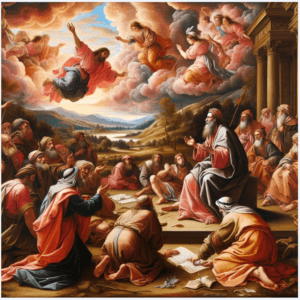 The previous verse was clear that Abraham gave all his great wealth to Isaac (Genesis 25:1–5). In addition, God’s covenant promises were established with Isaac, as well. He was the child of the promise.
The previous verse was clear that Abraham gave all his great wealth to Isaac (Genesis 25:1–5). In addition, God’s covenant promises were established with Isaac, as well. He was the child of the promise.
It was Abraham’s line through Isaac that would result in God’s chosen people Israel and, eventually, lead to Christ Himself. However, Abraham did not leave his sons by his concubines empty handed.
Though never referred to as a “concubine” exactly, it’s possible that this includes Hagar (Genesis 16:1–3). Abraham showed great affection for Ishmael, his son by Hagar, and Ishmael will participate in Abraham’s burial in the following verses.
Keturah, Abraham’s “other wife” after Sarah, is referred to as a concubine in 1 Chronicles 1:32. We’re not told of any other women who would have been considered Abraham’s concubines.
In any case, before Abraham died he gave gifts, probably from his vast wealth, to each of these sons and sent them away from Isaac.
Abraham was intent that Isaac remain in the promised land of Canaan and that there be no confusion, even after his death, about exactly who Abraham’s sole heir was.
To that end, Abraham sent all of these other sons away to the desert regions east of what would later become Israel. He did this while he yet lived. It is wisdom for men to do what they find to do while they live, as far as they can.
Genesis 25:7 KJV
And these are the days of the years of Abraham’s life which he lived, an hundred threescore and fifteen years.
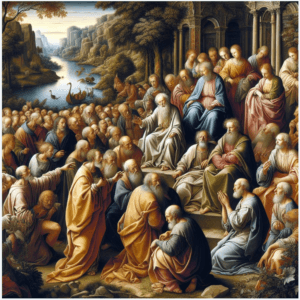 Finally, we come to the end of the pivotal and storied life of God’s chosen servant Abraham. He lived to be 175 years old, meaning he lived 100 years in the promised land of Canaan (Genesis 12:4).
Finally, we come to the end of the pivotal and storied life of God’s chosen servant Abraham. He lived to be 175 years old, meaning he lived 100 years in the promised land of Canaan (Genesis 12:4).
The text which follows explains the family trees which grew from Abraham’s long, eventful, and prosperous life.
Key among these groups are the descendants of Ishmael, and the line of Isaac. Isaac would father a son, Jacob, who would later be renamed Israel by God (Genesis 32:27–28).
Abraham lived 175 years; just one hundred years after he came to Canaan; so long he was a sojourner in a strange country.
Genesis 25:8 KJV
Then Abraham gave up the ghost, and died in a good old age, an old man, and full of years; and was gathered to his people.
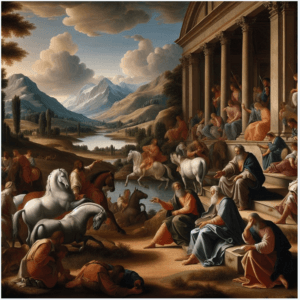 As the previous verse revealed, Abraham was 175 years old when he breathed his last. His life was marked by the blessing of God. That includes an extraordinarily long life span for his era (Genesis 6:3).
As the previous verse revealed, Abraham was 175 years old when he breathed his last. His life was marked by the blessing of God. That includes an extraordinarily long life span for his era (Genesis 6:3).
We’re told he was an old man and, poetically, that he was “full of years.” It’s important to note that Abraham is one of the key figures in all of history. As this chapter alone makes clear, he was the primary ancestor for many Middle Eastern tribes and nations, including Israel.
Three of the most influential religions in human history—Christianity, Judaism, and Islam—all claim Abraham as a spiritual patriarch.
The life of Abraham marks the beginning of God’s plan to create a people that were His very own and, eventually, to bring from that people the Messiah who would bring salvation to all nations.
Still, for such an important and consequential figure, Abraham led the life of a nomad. He was blessed and wealthy, but he lived out his days in the Promised Land in tents, frequently on the move.
In spite of God’s promises to give to his people the land of Canaan, Abraham died owning land which consisted only of a well, a field, and the cave in which he would be buried, as described in the following verse.
He did however apparently live to see the birth of his twin grandsons, an encouraging sign that God was keeping his promises to the next generation. Genesis 25:26 tells us that Isaac was 60 when Jacob and Esau were born.
Thus, Abraham would have been 160 or so (Genesis 21:5), with the opportunity to watch the boys grow out of childhood before he died.
Whether our stay in this life be long or short, it matters but little, provided we leave behind us a testimony to the faithfulness and goodness of the Lord, and a good example to our families.
Genesis 25:9 KJV
And his sons Isaac and Ishmael buried him in the cave of Machpelah, in the field of Ephron the son of Zohar the Hittite, which is before Mamre;
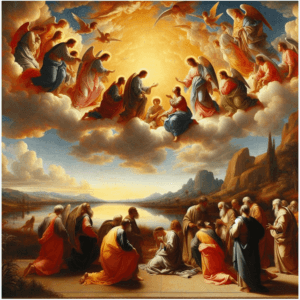 Genesis 23 describes in detail Abraham’s acquisition of the cave of Machpelah immediately following the death of Sarah. Now Isaac and Ishmael reunite to bury Abraham’s body in that cave alongside Sarah.
Genesis 23 describes in detail Abraham’s acquisition of the cave of Machpelah immediately following the death of Sarah. Now Isaac and Ishmael reunite to bury Abraham’s body in that cave alongside Sarah.
Abraham had sent away Ishmael, along with his mother Hagar. Ishmael was 16 or so and Isaac was around two (Genesis 21:8–14). Now the step-brothers would be somewhere around 89 and 75, respectively.
Ishmael’s presence at Abraham’s burial may imply there was some contact between Isaac and his birth family over the years. Despite this meeting to honor their father, God’s prophetic remarks about Ishmael would prove true (Genesis 16:11–12).
His descendants would become the enemies of Israel. We are told that his sons Isaac and Ishmael buried him.
It seems that Abraham had himself brought them together while he lived. Ishmael comes for the funeral because, after all, Abraham is his father. So Isaac and Ishmael together bury Abraham.
Genesis 25:10 KJV
The field which Abraham purchased of the sons of Heth: there was Abraham buried, and Sarah his wife.
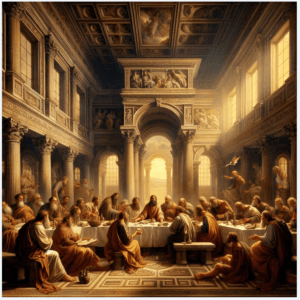 This verse completes the description of Abraham’s burial cave begun in the previous verse. The full details of Abraham’s acquisition of this cave, and the field attached to it, can be found in Genesis chapter 23.
This verse completes the description of Abraham’s burial cave begun in the previous verse. The full details of Abraham’s acquisition of this cave, and the field attached to it, can be found in Genesis chapter 23.
The important point of that narration is that Abraham legally purchased the field from a man named Ephron. This was done with the full approval of the counsel of the Hittites who lived in the region at the time.
Abraham’s legal ownership of the cave as a burial place was undisputed. Abraham was buried alongside Sarah, and not with his other wife Keturah, who was mentioned at the beginning of this chapter (Genesis 25:1–2).
He was also not buried alongside Hagar (Genesis 16:1–4), though their son Ishmael attended Abraham’s burial. This burial with Sarah emphasizes Abraham’s explicit, God-directed choice for his line and God’s blessing to flow through Isaac to future generations.
Let us not close the history of the life of Abraham without blessing God for such a testimony of the triumph of faith.
Genesis 25:11 KJV
And it came to pass after the death of Abraham, that God blessed his son Isaac; and Isaac dwelt by the well Lahai–roi.
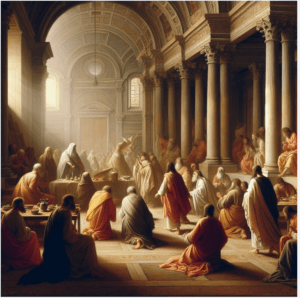 This verse says explicitly “the blessing,” God’s favor and promises for Abraham, moved to Isaac, as it would later move to Jacob.
This verse says explicitly “the blessing,” God’s favor and promises for Abraham, moved to Isaac, as it would later move to Jacob.
In spite of Ishmael’s presence at Abraham’s burial, Isaac was the promised child and the one chosen both by God and Abraham to continue the line of God’s own people (Genesis 17:18–19).
This oath is reflected in God’s blessings on Isaac, which continue after the death of his influential father. Isaac settled at Beer-lahai-roi. One of Genesis’ famous wells is located here.
It’s the place where Hagar heard from the Lord (Genesis 16:14) and was apparently Isaac’s preferred spot in the region at that time. Isaac goes down to live at the place where he first met Rebekah.
In verses 12 to 18 we have the generations of Ishmael, Abraham’s son, whom Hagar the Egyptian, Sarah’s handmaid, bare unto Abraham. The list of them is given here. I call to your attention again the fact that the Holy Spirit uses this method in the Book of Genesis.
The rejected line is given first and then set aside and not mentioned anymore. Then the line that is leading to Christ is given and followed. So it is after the line of Ishmael is given that we come to the line of Isaac.
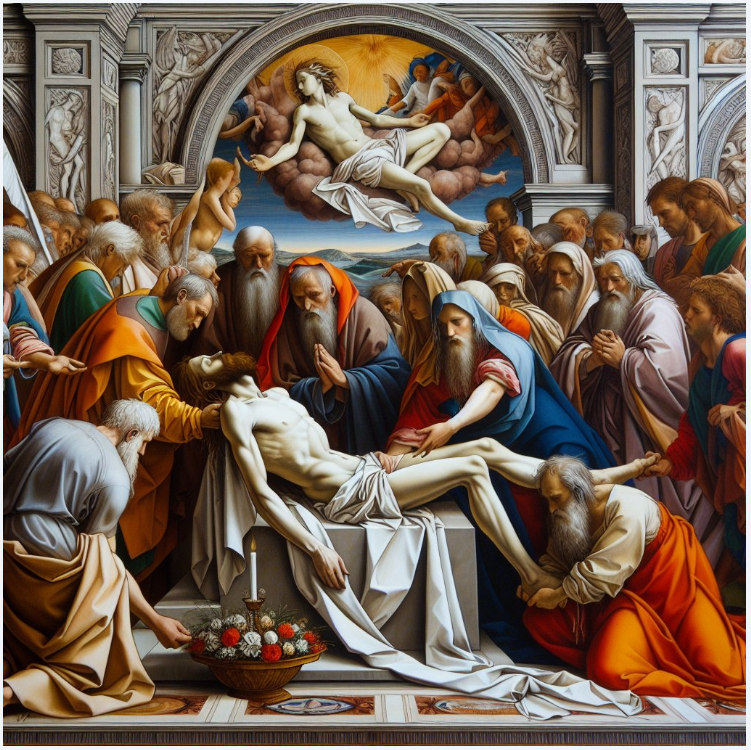
Abraham Dies part-2
Next, the chapter lists the 12 sons of Ishmael by birth order. The names of these “princes” became the names of the villages and encampments of the tribes that were their descendants.
These dozen groups settled to the east of what would become Israel. Ishmael himself lived a good long time, to the age of 137 (Genesis 25:12–18).
Genesis 25:12-18 KJV
[12] Now these are the generations of Ishmael, Abraham’s son, whom Hagar the Egyptian, Sarah’s handmaid, bare unto Abraham:
[13] And these are the names of the sons of Ishmael, by their names, according to their generations: the firstborn of Ishmael, Nebajoth; and Kedar, and Adbeel, and Mibsam,
[14] And Mishma, and Dumah, and Massa,
[15] Hadar, and Tema, Jetur, Naphish, and Kedemah:
[16] These are the sons of Ishmael, and these are their names, by their towns, and by their castles; twelve princes according to their nations.
[17] And these are the years of the life of Ishmael, an hundred and thirty and seven years: and he gave up the ghost and died; and was gathered unto his people.
[18] And they dwelt from Havilah unto Shur, that is before Egypt, as thou goest toward Assyria: and he died in the presence of all his brethren.
Genesis 25:12 KJV
Now these are the generations of Ishmael, Abraham’s son, whom Hagar the Egyptian, Sarah’s handmaid, bare unto Abraham:
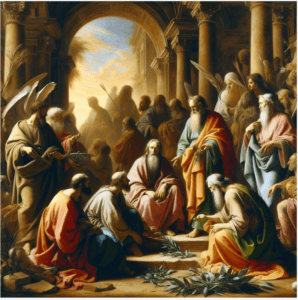 Genesis 25, coming at the end of Abraham’s life and the beginning of God’s blessing on and through Isaac, takes some time to establish the genealogies of all of Abraham’s sons.
Genesis 25, coming at the end of Abraham’s life and the beginning of God’s blessing on and through Isaac, takes some time to establish the genealogies of all of Abraham’s sons.
The verses following this one will describe the descendants of Ishmael, Abraham’s son with Hagar. Hagar had been Sarah’s Egyptian handmaid until, at Sarah’s urging, Abraham had married her in hopes of finally producing an heir.
The pregnancy that resulted, however, led to pain for all involved and not to the child of promise, as they had hoped (Genesis 16; 21:9–21). Still God blessed Ishmael in many ways, as He seems to have done for all the sons of Abraham (Genesis 12:1–3).
Genesis 25:13 KJV
And these are the names of the sons of Ishmael, by their names, according to their generations: the firstborn of Ishmael, Nebajoth; and Kedar, and Adbeel, and Mibsam,
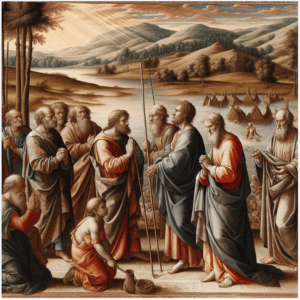 The twelve sons of Ishmael are listed by order of birth in this and the following verses. The Lord had promised to Hagar that Ishmael would father “twelve princes,” implying that each would become the head of his own clan or tribe (Genesis 17:20).
The twelve sons of Ishmael are listed by order of birth in this and the following verses. The Lord had promised to Hagar that Ishmael would father “twelve princes,” implying that each would become the head of his own clan or tribe (Genesis 17:20).
Indeed, several peoples carrying the names of Ishmael’s descendants become well known in the Middle East and in Israel’s history. Ishmael’s firstborn son Nebaioth becomes the representative of the family.
Isaac’s son Esau will later marry “Nebaioth’s sisters,” and Ishmael’s daughters, Mahalath and/or Basemath (Genesis 28:9; 36:3). It’s unclear if these are two women or one woman given two names.
Along with Nebaioth, Kedar became the name of a powerful Arab tribe. The descendants of Adbeel and Mibsam may have become lesser tribes in the region.
Genesis 25:14 KJV
And Mishma, and Dumah, and Massa,
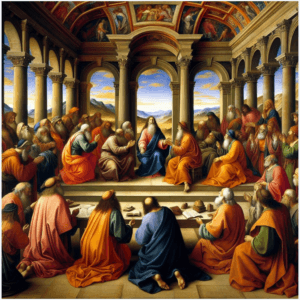 The twelve sons of Ishmael, named in order of birth, are given in Genesis 25:13–15. God had promised Ishmael’s mother, Hagar, that Ishmael would father “twelve princes.”
The twelve sons of Ishmael, named in order of birth, are given in Genesis 25:13–15. God had promised Ishmael’s mother, Hagar, that Ishmael would father “twelve princes.”
The prediction suggested that each would become the head of his own clan or tribe (Genesis 17:20). As expected, people groups carrying the names of Ishmael’s descendants would become influential; in the Middle East and in Israel’s history.
This verse continues the list with Mishma, Dumah, and Massa. The descendants of Dumah are apparently referenced in an oracle in Isaiah 21:11–12.
Genesis 25:15 KJV
Hadar, and Tema, Jetur, Naphish, and Kedemah:
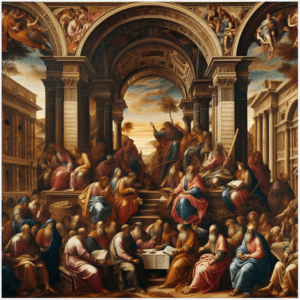 Genesis 25:13–15 lists the twelve sons of Ishmael, by birth order. Hagar was promised by God that Ishmael would father “twelve princes.” Each of his children would become the head of their own powerful tribe (Genesis 17:20).
Genesis 25:13–15 lists the twelve sons of Ishmael, by birth order. Hagar was promised by God that Ishmael would father “twelve princes.” Each of his children would become the head of their own powerful tribe (Genesis 17:20).
Multiple cultures bearing the names of Ishmael’s descendants went on to become major players in the history of the Middle East. This verse concludes the list with Hadad, Tema, Jetur, Naphish, and Kedemah.
Tema is mentioned in Job 6:19, Jeremiah 25:23, and Isaiah 21:14. The town of Tema, likely established by Tema’s descendants, was located near an oasis and became an important spot on regional trade routes.
Genesis 25:16 KJV
These are the sons of Ishmael, and these are their names, by their towns, and by their castles; twelve princes according to their nations.
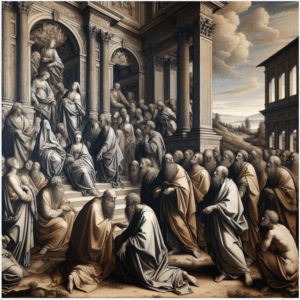 The previous verses listed the twelve sons of Ishmael. Here we’re told their names also become the names of their villages and encampments, each son a “prince” over his own tribe.
The previous verses listed the twelve sons of Ishmael. Here we’re told their names also become the names of their villages and encampments, each son a “prince” over his own tribe.
Together, the twelve tribes of Ishmael’s sons may have been a formidable force in the region. This fulfills a promise made to Hagar, the mother of Ishmael and a concubine of Abraham (Genesis 16:1–4; Genesis 21:8–14).
Despite being removed from Abraham’s family, Ishmael would be blessed with success, exactly as God had promised (Genesis 16:10–12). Ishmael had twelve sons, whose families became distinct tribes.
Genesis 25:17 KJV
And these are the years of the life of Ishmael, an hundred and thirty and seven years: and he gave up the ghost and died; and was gathered unto his people.
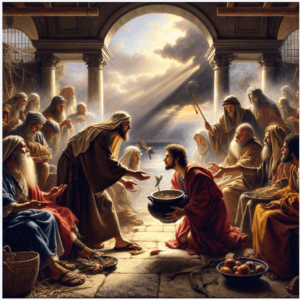 Ishmael’s life is summed up here with his biographical information. He died at the age of 137, some 50 years or so after Abraham’s death, allowing plenty of time to have seen God’s blessing as his twelve sons began to establish their individual families and tribes.
Ishmael’s life is summed up here with his biographical information. He died at the age of 137, some 50 years or so after Abraham’s death, allowing plenty of time to have seen God’s blessing as his twelve sons began to establish their individual families and tribes.
Though he was not the son given the promises of inheritance from Abraham (Genesis 17:18–19), Ishmael was given prosperity and success by God.
This corresponds to the reassurance God gave to Ishmael’s mother, Hagar (Genesis 16:10–12), long before she was evicted from the family at the request of Abraham’s wife, Sarah (Genesis 21:8–14).
Genesis 25:18 KJV
And they dwelt from Havilah unto Shur, that is before Egypt, as thou goest toward Assyria: and he died in the presence of all his brethren.
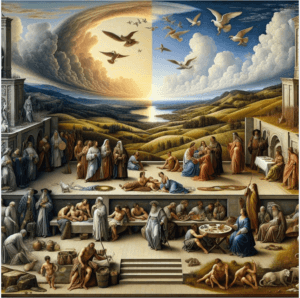 Ishmael’s twelve sons, listed in the previous verses, became twelve tribes, establishing villages or wandering camps named for each of them. These twelve groups settled primarily in the region to the east of the land that would become Israel.
Ishmael’s twelve sons, listed in the previous verses, became twelve tribes, establishing villages or wandering camps named for each of them. These twelve groups settled primarily in the region to the east of the land that would become Israel.
This fulfills a promise God made to Hagar, Ishmael’s mother. Before they were evicted from Abraham’s family (Genesis 21:8–14), God vowed to make Ishmael and his offspring successful (Genesis 16:10–12).
That prophecy came with more than just an assurance of success, however. In Genesis 16:12, God had also prophesied that Ishmael would become a wild donkey of a man who would dwell over and against all his kinsmen.
Now we see that is what became of Ishmael’s sons, perhaps suggesting their later conflicted relationship with Israel. They peopled a very large country that lay between Egypt and Assyria, called Arabia.
The number and strength of this family were the fruit of the promise, made to Hagar and to Abraham, concerning Ishmael.
I hope that you have really enjoyed this post,
Please Leave All Comments in the Comment Box Below ↓

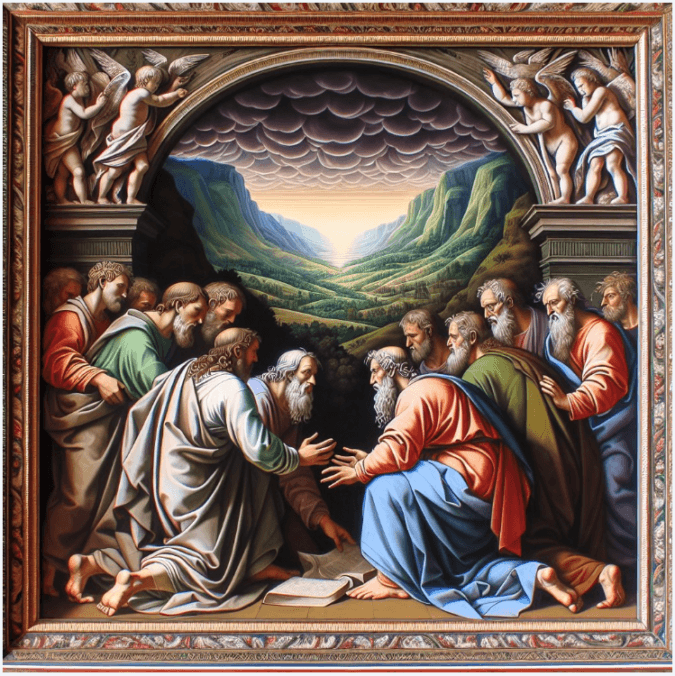











Abraham was always aware that Isaac was his true heir; his other sons were just there to add some blessings, but Isaac was the chosen one.
Yes, Ishmael and Isaac had some contact and I don’t think that they were enemies themselves, though their descendants would be as we can still see it today. It is said in the Book of Jubilees that the Arabs are the descendants of Ishmael’s descendants and Keturah’s descendants.
Hello again angelce903,
Thanks for continuing to stop by and comment on this platform, and for letting us know that you study the Book of Jubilees.
Blessings My Friend!
Great article!
One thing that I have learned from wanting to hang out with this big guy is that it’s all about having a chill vibe with the ultimate Chill Dude. Prayer is like texting your best friend, but way cooler. It’s how we chat, share our stuff, and listen to what He’s got to say.
Have you ever felt like you wanna connect deeper?
Prayer’s your jam. It’s like hitting up God for a heart-to-heart. We can thank Him for the good stuff, spill our worries, and just chill in His presence.
Hello Clair,
Thanks for the kind words and for sharing your thoughts!
I love that analogy—prayer really is like a deep, personal chat with a best friend! It’s such a comforting way to stay connected and grounded. For me, prayer is a space where I can be totally honest and let go of everything on my mind. I totally agree—prayer can be such a personal and relaxed way to connect. It’s like having a heartfelt conversation with someone who truly understands and cares.
I do find that some moments of quiet reflection really help me connect on a deeper level.
Thanks again for your comment, it is greatly appreciated,
Blessings Our Friend!
I’m curious about how others interpret some of the details in Abraham’s story.
For instance, what do you think about Abraham giving all his possessions to Isaac while giving gifts to his other sons and sending them away?
Does this tell us anything about inheritance practices in biblical times, or maybe it’s more about Abraham’s faith in God’s promises?
Another point that caught my attention is when the Bible says Abraham was “gathered to his people” after his death.
What do you think this phrase means?
How do you think the people of ancient Israel might have understood it, especially regarding beliefs about the afterlife?
And then there’s the relationship between Isaac and Ishmael.
Their reunion to bury their father seems significant—how do you think this reflects on the themes of reconciliation and family in the Bible?
Are there any lessons we can draw from their story that apply to modern-day family conflicts?
Abraham’s life is fascinating, marked by great faith but also by very human struggles, like his relationships with Hagar and Keturah.
How do these parts of his story help us understand faith and obedience better?
What can we learn from Abraham’s journey, especially about trusting in God’s plan even when we fall short?
The Bible also places importance on Abraham being buried alongside Sarah in the cave of Machpelah.
Why do you think this burial place is so emphasized?
How does it fit into the broader narrative of God’s covenant with Abraham and his descendants?
I’d love to hear from anyone who has had to trust in God’s promises without seeing immediate results—how did your faith guide you through that, and what impact did it have on your relationship with God?
Finally, Abraham is often called “the father of the faithful,” and his story is central to many people’s faith.
In your view, what makes his story so enduring and influential throughout history?
And how do you find the balance between trusting in God’s will and taking proactive steps in your own life?
Hello Lawrence,
Thanks for stopping by HBS & DwJ.
Abraham’s story indeed offers profound insights into faith, inheritance, and family dynamics.
Inheritance Practices and Faith: Abraham’s decision to give all his possessions to Isaac while providing gifts to his other sons and sending them away reflects a nuanced view of inheritance. In ancient biblical times, the firstborn or the primary heir often received a double portion of the inheritance, which was a way to secure the family line and the promises associated with it.
Isaac, being the son of Sarah and the child of the covenant, naturally receives the primary inheritance. The gifts to the other sons and their departure can be seen as a means of ensuring they were cared for while also emphasizing Isaac’s central role in fulfilling God’s promises. This separation might also signify a focus on maintaining a distinct lineage through Isaac.
“Gathered to His People”: The phrase “gathered to his people” is intriguing. It likely signifies a belief in a communal resting place after death, suggesting that Abraham was reunited with his ancestors or those who had passed before him. Ancient Israelites might have understood this phrase as indicating a form of communal afterlife or resting place for the righteous, reflecting their evolving beliefs about the afterlife and divine justice.
Isaac and Ishmael’s Reunion: The reunion of Isaac and Ishmael to bury Abraham is a powerful symbol of reconciliation. Their joint act of honoring their father suggests a moment of healing and unity, despite their previous conflicts. This can be seen as a message about the importance of overcoming past grievances for the sake of family and shared heritage. For modern readers, it underscores the value of reconciliation and the potential for healing in family relationships.
Faith and Obedience: Abraham’s life, including his relationships with Hagar and Keturah, highlights the complexities of faith and human frailty. His journey shows that faith is not just about unwavering obedience but also about trust in God’s promises even when the path is uncertain or when mistakes are made. Abraham’s story encourages us to continue trusting and following God’s guidance, despite our shortcomings.
Burial in the Cave of Machpelah: The emphasis on Abraham being buried in the cave of Machpelah alongside Sarah underscores its significance as a familial and covenantal landmark. This site, purchased by Abraham, symbolizes the fulfillment of God’s promise of land and the continuity of the covenant. It reinforces the idea that God’s promises are not just spiritual but also material and tangible, tied to specific places and people.
Enduring Influence: Abraham’s story is often called the “father of the faithful” because it embodies a model of faith and trust that transcends religious and cultural boundaries. His life illustrates the enduring nature of divine promises and the importance of faith in the face of uncertainty. For many, Abraham’s journey is a testament to the power of trust and obedience, providing a model for navigating our own challenges.
Balancing Faith and Action: Balancing trust in God’s will with proactive steps in our lives involves recognizing that faith is both a trust in divine providence and an invitation to act responsibly within that framework. Abraham’s story teaches us that while we trust in God’s plan, we must also take actionable steps in alignment with that plan, demonstrating our faith through our actions.
I’d love to hear more about how others have experienced their own journeys of faith and trust, especially when faced with challenges or uncertainties.
How have these experiences shaped their understanding of God’s promises?
Thanks again for the value you add to this conversation.
Blessings My Friend!
Abraham is known as the father of faith, God was so pleased with the faith that Abraham demonstrated in Him that God blessed Abraham and his seed.
The wealth that he had in his day would either make him a billionaire or a trillionaire. He had many sons and daughters when he was well over 100. Because of his obedience to God, he is not only recognized as the blessed one but all who come into covenant with God are Known spiritually as Abraham’s sons and daughters.
Hello Norman,
That’s a thoughtful reflection on Abraham’s role in spiritual history!
His unwavering faith and obedience indeed set a profound example. It’s incredible to think about how his legacy extends beyond his time, impacting countless lives through the covenant with God. His story really illustrates the powerful connection between faith and divine blessing.
Thank you for commenting,
Blessings My Friend!
This was a thought-provoking exploration of Abraham’s life and the significance of his lineage.
I have a few questions regarding the timeline of events:
❓How do we reconcile the timeline of Abraham’s marriage to Keturah with Sarah’s death?
Was Keturah indeed married to Abraham before Sarah passed, or was she considered a concubine only after?
❓What specific blessings did God bestow upon Isaac after Abraham’s death, and how did those blessings manifest in his life?
Additionally, I find it fascinating how the descendants of Ishmael were described as tribes. It’s intriguing to see how God’s promises extended beyond Isaac, despite the primary covenant being with him.
I personally believe that understanding these family dynamics provides valuable insight into the historical and prophetic context of the Bible. The relationships and tensions between these groups still resonate today. It’s a reminder of the complex nature of faith and lineage in shaping history.
Thanks for sharing this insightful post!
Hello Candice,
Thank you for your thoughtful and engaging questions!
You’ve raised some compelling points about Abraham’s timeline and the broader implications of his family dynamics.
To address your first question, the timeline of Abraham’s marriage to Keturah in relation to Sarah’s death can be a bit complex. According to Genesis 25:1-2, Abraham married Keturah after Sarah’s death. This would suggest that Keturah was not a concubine during Sarah’s lifetime but rather became Abraham’s wife afterward. The Bible doesn’t provide a detailed timeline, but this sequence helps clarify their relationship.
Regarding the blessings bestowed upon Isaac, Genesis 25:11 indicates that God blessed Isaac after Abraham’s death. These blessings are seen in Isaac’s prosperity and his continued role in the covenantal promises. Isaac’s life, marked by his relationship with Rebekah and the birth of his sons Esau and Jacob, reflects the continuation of the covenant that was established with Abraham.
Your observation about the descendants of Ishmael being described as tribes is insightful. It underscores the notion that God’s promises extended beyond Isaac and highlights the importance of understanding how these promises and blessings played out across different lineages. The complexity of these relationships indeed provides a rich context for interpreting the historical and prophetic dimensions of the biblical narrative.
Thank you for contributing such thought-provoking questions to the discussion. It’s always enriching to explore how these ancient stories continue to resonate and shape our understanding of faith and history.
Blessings My Friend!
This post is extremely useful for those interested in biblical studies, particularly in understanding the life and legacy of Abraham.
The detailed analysis of Genesis 25:1-18 provides valuable insights into Abraham’s family dynamics, his relationships with his sons, and the fulfillment of God’s promises to him. The author’s thorough explanation of the historical and cultural context makes the biblical account more accessible and easier to comprehend.
The post raises important questions about the nature of faith, family, and legacy, encouraging readers to reflect on their own relationships and priorities. It also highlights the significance of Abraham’s story in the broader narrative of the Bible, demonstrating how his life and choices have shaped the course of human history.
For further discussion, some potential topics could include:
1. The role of faith and trust in Abraham’s life and decisions.
2. The complexities of family relationships and dynamics in the biblical account.
3. The significance of legacy and inheritance in the context of Abraham’s story.
4. The ways in which God’s promises and prophecies are fulfilled throughout the biblical narrative.
5. The relevance of Abraham’s story to contemporary issues and challenges.
Hello Cyril,
Thank you for your thoughtful and engaging comment!
I’m glad you found the post useful and that it sparked reflections on Abraham’s life and legacy. Your suggestions for further discussion are excellent and would indeed deepen the conversation. Exploring the role of faith in Abraham’s decisions, the intricacies of his family relationships, and the broader implications of his legacy all offer rich avenues for understanding the profound impact of his story.
Additionally, examining how God’s promises unfold and resonate in today’s context could provide valuable insights into contemporary issues. If anyone has specific perspectives or questions on these topics, it would be wonderful to delve into them further.
Thank you for contributing to this meaningful dialogue!
Blessings My Friend!